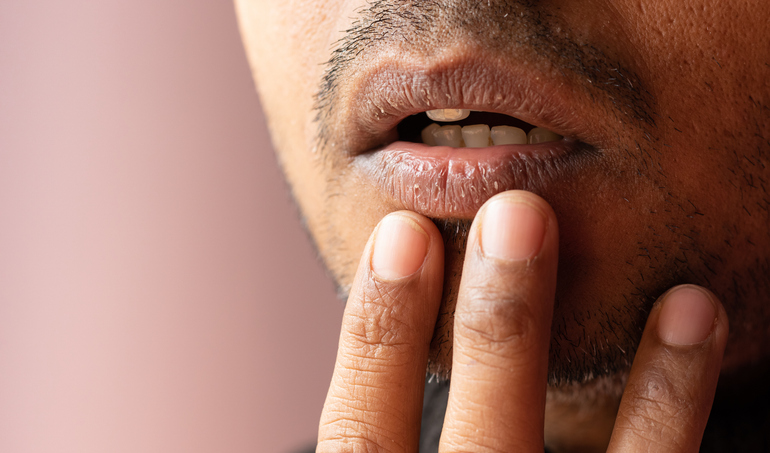
A well-lubricated mouth does far more than keep you comfortable while you chat and chew. Healthy saliva flow helps neutralize acids, rinse away food particles, strengthen enamel with minerals, and even control bacteria that cause cavities and bad breath. When that moisture disappears, everyday tasks like swallowing or speaking can feel uncomfortable—and your oral health faces new risks. Today, let’s explore what causes dry mouth (also known as xerostomia), why it matters, and the practical steps you can take—alongside Dr. Nathaniel M. Taylor and the North Royalton Family Dental team—to restore moisture, protect enamel, and enjoy naturally fresher breath.
Why Saliva Is Indispensable
Saliva is the unsung hero of your smile. On average, you produce about two to four pints a day, and each drop:
- Buffers acid attacks. Saliva dilutes and neutralizes acids from food and plaque, blocking early stages of enamel erosion.
- Delivers minerals. Calcium, phosphate, and fluoride ions in saliva constantly remineralize microscopic weaknesses in tooth surfaces.
- Washes debris away. Every swallow clears sugars, starches, and bacteria from teeth.
- Begins digestion. Enzymes such as salivary amylase break down carbohydrates before they hit your stomach.
- Keeps tissues resilient. Adequate moisture prevents cracked lips, mouth sores, and irritation.
When saliva flow slows, those benefits evaporate. The result? Higher cavity risk, foul breath, difficulty tasting or swallowing, and an increased chance of infected gums.
Common Culprits Behind Dry Mouth
Understanding why your mouth feels like a desert helps you choose the right solutions. The most frequent contributors include:
1. Medications
Hundreds of prescriptions and over-the-counter remedies list dry mouth as a side effect. Antihistamines, decongestants, antidepressants, blood-pressure drugs, and muscle relaxants top the chart.
2. Medical Conditions
Diseases such as diabetes, Sjögren’s syndrome, Parkinson’s, rheumatoid arthritis, and stroke can damage the glands that produce saliva.
3. Cancer Therapy
Radiation directed at the head or neck and certain chemotherapy agents may injure salivary tissue, sometimes permanently reducing flow.
4. Hormonal Shifts
Menopause and thyroid disorders can decrease moisture levels throughout the body—including the oral cavity.
5. Lifestyle Choices
Smoking or vaping, frequent alcohol use, and caffeine consumption all restrict saliva production. Dehydration, whether from insufficient water or intense exercise, compounds the issue.
6. Mouth Breathing & Sleep Habits
Chronic nasal congestion, CPAP devices, or simply sleeping with an open mouth exposes tissues to constant airflow, drying them out overnight.
Signs You Shouldn’t Ignore
Dry mouth doesn’t always announce itself with dramatic symptoms. Watch for:
- A sticky, thick, or stringy feeling in the mouth
- Constant thirst or sore throat
- Cracked lips or corners of the mouth
- Rough tongue or trouble speaking clearly
- Burning sensations, especially on the tongue
- Altered taste perception or difficulty chewing/swallowing
- Persistent bad breath despite brushing and flossing
If any of these apply to you, scheduling an evaluation with Dr. Taylor helps pinpoint the cause and prevent complications before they escalate.
Simple Daily Habits to Restore Moisture
1. Hydrate Strategically
Sip water throughout the day, not just at meals. Keep a reusable bottle nearby and aim for small, frequent swallows. Plain water is best; acidic or sugary drinks can actually worsen dryness and harm enamel.
2. Chew Sugar-Free Gum or Lozenges
Products containing xylitol stimulate salivary flow while reducing cavity-causing bacteria. Look for gum approved by the ADA Seal of Acceptance to ensure it’s both safe and effective for dental health.
3. Switch to Alcohol-Free Mouthwash
Standard mouthwashes often contain alcohol, which evaporates quickly and can exacerbate dryness. Instead, choose formulas labeled “alcohol-free” or “dry-mouth.” Many include humectants and lubricating agents to coat tissues.
4. Breathe Through Your Nose
If congestion forces you to breathe orally, consult your physician or allergist about treatment. Clear nasal passages encourage natural humidification, reducing evaporation inside the mouth.
5. Limit Caffeine, Alcohol, and Tobacco
Coffee, energy drinks, beer, wine, and spirits draw moisture out of tissues, while smoking constricts blood vessels feeding salivary glands. Cutting back can produce noticeable relief within days.
6. Use a Cool-Mist Humidifier
Running a humidifier at night adds moisture to bedroom air, particularly helpful if bedroom heat or winter furnaces dry out soft tissues as you sleep.
Nutrition Tweaks for a Moister Mouth
- Crunch on raw fruits and veggies. Apples, carrots, celery, and bell peppers naturally stimulate saliva through chewing.
- Add hydrating foods like cucumbers, watermelon, and oranges to your menu.
- Choose sugar-free yogurt or soft cheese for protein—they’re rich in calcium and less likely to cling to enamel than sticky snacks.
- Avoid highly salted or spicy foods if they irritate parched tissues.
- Rinse after acidic foods (citrus, tomato sauce) and wait 30 minutes before brushing to avoid enamel softening.
Over-the-Counter Helpers
Saliva Substitutes & Oral Moisturizers
Available as sprays, gels, or rinses, these products mimic natural saliva’s viscosity, easing speech and swallowing. Keep them bedside or in your purse for quick relief.
Fluoride Mouth Gels
If you experience frequent cavities, a neutral pH fluoride gel applied nightly with a custom tray fortifies enamel while you sleep.
Remineralizing Toothpastes
Formulas containing calcium phosphate or nano-hydroxyapatite deliver building blocks for enamel repair alongside fluoride.
Always follow usage instructions, and mention new products at your next appointment so we can monitor their effectiveness.
When Professional Care Becomes Essential
Dry mouth that lingers despite home remedies deserves thorough evaluation. Dr. Taylor will:
1. Review Medical History & Medications
Sometimes adjusting dosage or switching to an alternative drug (with your physician’s guidance) lessens dryness.
2. Examine Salivary Gland Function
Gentle palpation and imaging, when necessary, reveal gland blockages or infections.
3. Assess Enamel and Gum Health
Early detection of “chalky” white-spot lesions, decay, or gum inflammation prevents bigger interventions later.
4. Recommend Prescription Solutions
Medications such as pilocarpine or cevimeline can boost natural saliva production for many patients.
5. Create a Customized Prevention Plan
This might include topical fluoride varnishes, sealants for vulnerable surfaces, or specialized night guards if mouth breathing and bruxism overlap.
Protecting Enamel: A Priority Strategy
Once dryness sets in, enamel loses part of its natural defense system. To safeguard your smile:
- Brush with a soft-bristle toothbrush and gentle pressure. Aggressive scrubbing can scratch matte, demineralized enamel.
- Use a fluoride toothpaste twice daily. Fluoride integrates into enamel, increasing resistance to acid.
- Floss carefully. Plaque buildup accelerates decay in dry environments; flossing removes bacteria from tight spaces bristles miss.
- Schedule cleanings every six months (or more often if recommended). Professional polishing and targeted varnish applications reinforce weak areas.
Fresh Breath Tactics That Really Work
- Clean your tongue. Up to 80 percent of odor-causing compounds arise from bacteria on the tongue’s surface. Use a dedicated scraper or the back of your toothbrush nightly.
- Stay on top of hydration. Dry mouth concentrates volatile sulfur compounds, intensifying odor. Water dilutes them and encourages regular swallowing.
- Snack smart. Crunchy produce like parsley, celery, and carrots offers natural mechanical cleansing and stimulates saliva.
- Consider probiotics. Oral probiotic lozenges introduce “friendly” strains that crowd out odor-producing bacteria.
- Visit us for persistent halitosis. Chronic bad breath may indicate cavities, gum disease, or sinus issues requiring professional treatment.
Partnering with North Royalton Family Dental
Our dental team understands how frustrating (and sometimes embarrassing) dry mouth can feel. Dr. Taylor pairs compassionate listening with state-of-the-art diagnostic tools to find root causes and create tailored solutions. Whether you need a simple switch to an alcohol-free rinse or prescription salivary stimulants, we’ll guide you step by step.
During each visit, we also:
- Monitor enamel integrity to catch early signs of decay.
- Check soft tissue health for irritation or fungal infections common in xerostomia.
- Share personalized hygiene tips based on your diet, medical history, and lifestyle.
Take the Next Step Toward Comfortable, Confident Smiles
Dry mouth doesn’t have to control your day or compromise your oral health. Simple actions—staying hydrated, choosing the right products, and partnering with our experienced team—bring noticeable relief and long-term protection.
If your mouth feels parched more often than not, call North Royalton Family Dental or request an appointment online today. Together, we’ll restore moisture balance, preserve your enamel, and keep your breath fresh—so you can smile, speak, and dine without hesitation.

